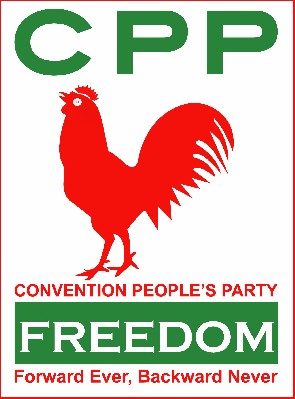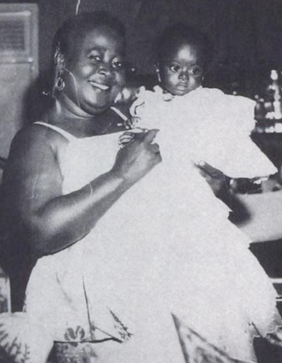Related Research Articles

Francis Kwame Nkrumah was a Ghanaian Marxist politician, political theorist, and revolutionary. He served as Prime Minister of the Gold Coast from 1952 until 1957, when it gained independence from Britain. He was then the first Prime Minister and then the President of Ghana, from 1957 until 1966. An influential advocate of Pan-Africanism, Nkrumah was a founding member of the Organization of African Unity and winner of the Lenin Peace Prize from the Soviet Union in 1962.

The national flag of Ghana consists of a horizontal triband of red, yellow, and green. It was designed in replacement of the British Gold Coast's Blue Ensign.

Komla Agbeli Gbedemah was a Ghanaian politician and Minister for Finance in Ghana's Nkrumah government between 1954 and 1961. Known popularly as "Afro Gbede", he was an indigene of Anyako in the Volta Region of Ghana.

The Convention People's Party (CPP) is a socialist political party in Ghana based on the ideas of the first President of Ghana, Kwame Nkrumah. The CPP was formed in June 1949 after Nkrumah broke away from the United Gold Coast Convention (UGCC).

Joseph Kwame Kyeretwie Boakye Danquah was a Ghanaian politician, scholar, lawyer and statesman. He was a politician in pre- and post-colonial Ghana, which was formerly the Gold Coast, and is credited with giving Ghana its current name.

The Union of African States, sometimes called the Ghana–Guinea–Mali Union, was a short-lived and loose regional organization formed in 1958 linking the West African nations of Ghana and Guinea as the Union of Independent African States. Mali joined in 1961. It disbanded in 1963.

The National Liberation Council (NLC) led the Ghanaian government from 24 February 1966 to 1 October 1969. The body emerged from a coup d'état against the Nkrumah government carried out jointly by the Ghana Police Service and Ghana Armed Forces with collaboration from the Ghana Civil Service.

Parliamentary appointments were held in Ghana in 1965. As the country was a one-party state at the time, no parties except President Kwame Nkrumah's Convention People's Party (CPP), were allowed to participate. All candidates were appointed by the President and his party.

Samia Yaba Christina Nkrumah is a Ghanaian politician and chairperson of the Convention People's Party (CPP). In the 2008 parliamentary election, she won the Jomoro constituency seat at her first attempt. She is the daughter of Kwame Nkrumah, first President of Ghana.

Susanna Al-Hassan or Susan Alhassan was a Ghanaian author and politician, who in 1961 became Ghana's first female to be appointed minister. She was the first African woman to hold a cabinet portfolio and became the member of parliament for the then Northern Region parliamentary constituency between 1960 and 1966. She also wrote several children's books.
Real Republicans Football Club were a Ghanaian association football club based in the capital, Accra, along with Hearts of Oak, one of the most successful Ghanaian clubs in recent years. It was claimed it held Ghana's record for the most consecutive wins, four. The club claimed it formed the core of the national team, Ghana Black Stars.
Ohene Djan was a Ghanaian sports administrator. He was the First Director (Minister) of Sports of Ghana at the Central Organisation of Sports (COS) and was also vice-president of the Confederation of African Football.

Nkrumaism is an African socialist political ideology based on the thinking and writing of Kwame Nkrumah. Nkrumah, a pan-Africanist and socialist, served as Prime Minister of the Gold Coast from 1952 until 1960 and subsequently as President of Ghana before being deposed by the National Liberation Council in 1966.
Mabel Dove Danquah was a Gold Coast-born journalist, political activist, and creative writer, one of the earliest women in West Africa to work in these fields. As Francis Elsbend Kofigah notes in relation to Ghana's literary pioneers, "before the emergence of such strong exponents of literary feminism as Efua Sutherland and Ama Ata Aidoo, there was Mabel Dove Danquah, the trail-blazing feminist." She used various pseudonyms in her writing for newspapers from the 1930s: "Marjorie Mensah" in The Times of West Africa; "Dama Dumas" in the African Morning Post; "Ebun Alakija" in the Nigerian Daily Times; and "Akosua Dzatsui" in the Accra Evening News. Entering politics in the 1950s before Ghana's independence, she became the first woman to be elected a member of any African legislative assembly. She created the awareness and the need for self-governance through her works.

Hannah Esi Badu Kudjoe, née Hannah Dadson, was a prominent activist for Ghanaian independence in the 1940s and 1950s. She was one of the first high-profile female nationalists in the movement, and was the National Propaganda Secretary for the Convention People's Party. She was a political activist during the government of Dr. Kwame Nkrumah. She was also an active philanthropist and worked to improve women's lives in Northern Ghana. Hannah had the ability to bring people together. She was able to convince others to support and fight for independence. She helped Kwame Nkrumah in bringing people to join the CPP and support it. She once helped the Big Six when they were arrested by bringing people together to call for their release by the colonial government.
The National Federation of Gold Coast Women (NFGCW), later renamed the Ghana Federation of Women, was a women's organization in the Gold Coast, one of the country's first women's organizations. Established by Evelyn Amarteifio in 1953, it was dissolved in 1960 as Kwame Nkrumah pursued government control of women's organizations in Ghana.
Dr. Evelyn Mansa Amarteifio (1916-1997) was a Ghanaian women's organiser. In 1953 she established the National Federation of Gold Coast Women (NFGCW).
John Kofi Barku Tettegah (1930–2009) was a Ghanaian trade unionist, diplomat, and politician. He held many influential positions in Ghana's government especially during the Nkrumah government, where he served as general-secretary of the Gold Coast Trades Union Congress (TUC), as a Convention People's Party (CPP) central committee member, and secretary-general of the All-African Trade Union Federation. He was influential to Kwame Nkrumah's domestic and foreign policy, and remains one of the most influential political organizers in Ghanaian labor history.
Hans Kofi Boni is a Ghanaian politician during the first republic of Ghana. He was the Member of parliament (MP) for Ho West.
References
- 1 2 Kathleen Sheldon (2016). "National Council of Ghana Women". Historical Dictionary of Women in Sub-Saharan Africa. Rowman & Littlefield. pp. 167–8. ISBN 978-1-4422-6293-5.
- ↑ Naaborko Sackeyfio-Lenoch (Spring 2018). "Women's International Alliances in an Emergent Ghana". Journal of West African History. 4 (1): 27–56. ISSN 2327-1868.
- ↑ Rose Miyatsu, Tracking the history of women's welfare work in Ghana, The Ampersand, Washington University in St Louis, 11 January 2020. Accessed 18 April 2020.
- 1 2 3 Adwoa Kwakyewaa Opong, Rewriting Women into Ghanaian History, 1950-1966, MPhil thesis, University of Ghana, September 2012, pp.83ff.
- ↑ Frank Ohemeng, Augustina Adusah-Karikari and Abigail Hilson, Affirmative Action as the Route to Representative Bureaucracy in the Public Sector in Developing Countries:the perspective from Ghana, International Public Policy Association Conference, June 2018.